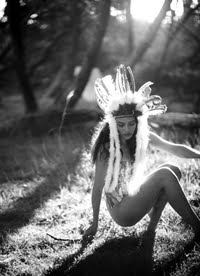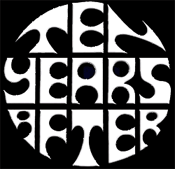
 Of all the bands that made up the mid-‘60s San Francisco scene, the Wildflower may have been the perfect conglomeration of Haight Street expectations. Combining the streamlined, jet-age folk-rock sound of Takes Off-era Jefferson Airplane, jammy aspects of the Grateful Dead, the pretty harmonies of Sopwith Camel and We Five, bluesy numbers like Quicksilver Messenger Service and Big Brother and the Holding Company, and the folk punk of the Harbinger Complex, the Wildflower were not some cheap imitation of these groups. They were contemporaries of them, sharing smoky nightclubs and ballroom stages from day one. And though they were there from the beginning, were courted and trotted out with the best of them, the Wildflower never landed "the big one," and thus, sadly and unfairly, have remained but a footnote in San Francisco music history.
Of all the bands that made up the mid-‘60s San Francisco scene, the Wildflower may have been the perfect conglomeration of Haight Street expectations. Combining the streamlined, jet-age folk-rock sound of Takes Off-era Jefferson Airplane, jammy aspects of the Grateful Dead, the pretty harmonies of Sopwith Camel and We Five, bluesy numbers like Quicksilver Messenger Service and Big Brother and the Holding Company, and the folk punk of the Harbinger Complex, the Wildflower were not some cheap imitation of these groups. They were contemporaries of them, sharing smoky nightclubs and ballroom stages from day one. And though they were there from the beginning, were courted and trotted out with the best of them, the Wildflower never landed "the big one," and thus, sadly and unfairly, have remained but a footnote in San Francisco music history.The Wildflower was born in a time before the whole world knew about San Francisco and the fun its denizens were having. The Beat scene of North Beach had been slowly evolving into something new. The area around Haight and Ashbury, near where the universities were, was a low-rent paradise filling up with creative young people, recently untethered from their families and ready to try just about anything. But as more and more people arrived to take part in the celebration, things started to take a turn. By the time Surrealistic Pillow hit the racks at Magic Flute, exploitative articles declaring the Haight a hippy haven filled the pages of mainstream rags like Look and Life. People began piling into the City by the busload and things quickly became messy and overcrowded. "Not since the California Gold Rush had San Francisco been flooded with such a large group of outsiders carrying dreams and little else," wrote Pam Tent in her Cockettes memoir Midnight at the Palace. Listening to Love is the Song We Sing, Rhino Record's recently released history of the Bay Area rock scene, you can actually hear the dissolution of the fraternity. Things get horny and more bombastic post-‘67. For the most part harmonies go out there door in favor of scorching leads and caterwauling vocals. By 1969 the best days of San Francisco were way behind it. From the band bio webpage

The Wildflower got their start in Oakland in ’65 and quickly got to gigging ‘round Bay Area venues like the Straight Theatre, the Fillmore, Avalon Ballroom, and even the Red Dog Saloon up in Virginia City where the Charlatans did their thang. Like the Dead, the Wildflower had a poet on the payroll—Michael McCausland—who, as Robert Hunter did for Jerry and co., tossed down heady lyrics for the guys to twang behind. And twang they did. Their harmonious Frisco folk rock is pretty much what you’d describe if you were trying to nail down a definition of “that” sound. Only better. The bad news is the only thing ever released back then were four tracks they contributed to the A Pot of Flowers comp—Mainstream’s stab at documenting the Frisco hippy scene (two of ‘em came out as a single as well). But what songs they were. Jangly and oftentimes mystical, they sit confidently alongside the other (absolutely killer) Bay Area groups on the record, the Otherside and Harbinger Complex.
The good news is that lead Flower Stephen Ehret thought it would be a good idea to go back in the studio now and record all the old songs that never made it to tape. My own modern recording prejudices aside, the results are pretty darned good. The harmonies are still there, in that haunting post-folk way that only kids who lived crowded together in Victorians could achieve. First there’s “Message to You”—uncannily catchy, a little mellowed with age, but take away the feelgoodness and it’s a Markley-esque ditty with great self-introspection lyrics (something the Wildflower is good at if you’ve heard their “Wind Dream”). “Please Come Home” suffers the most from… uhhh, technology, but underneath the Heavy Metal Pedal the secret’s revealed as to where Paul Kantner got his ideas for Blows Against the Empire. “Of Planets, Mirrors, and Men” has a haunting New Age Native/American vibe (in a good way!) and is reminiscent melody-wise of “Ripple” which it probably predates. “On Even Red” is a simply fantastic combo of Brautigan sincerity and get-chicks harmonies (pretty much the same thing I guess)—a tune criminally missing from our psyche for the last forty years. A song like “In My Mind,” with its “Hi–de-hi” verse easing into the heavier chorus must’ve been a trip live had we all been around to catch it. You can’t have it all, but stuff like this kinda makes up for it.
ERIC BLUHM Ugly-Things magazine
This Cd is available from the band on their website at http://thewildflower-sf.com/index.html























































































2 comments:
Nice to see you back again!
louashbury
I haven't heard the music yet but the lettering is fantastic.
Post a Comment